EC
-
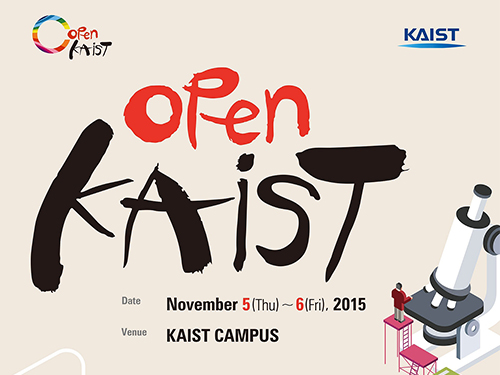 Open KAIST 2015
KAIST’s research environment and its most recent achievements were open to the public.
KAIST hosted “Open KAIST 2015” over two days from November 5-6, 2015 in which its 17 departments and three research centers were open to the public. The event is one of the largest events that KAIST holds, which permits such public viewings of its facilities. It is the eighth time it has taken place.
During this event, the departments and centers offered 64 programs including laboratory tours, research achievement exhibitions, department introductions, and special lectures.
The “Motion Capture System”of Professor Jun-Yong Noh’s lab (Graduate School of Culture Technology) drew particular attention.
The “Motion Capture System” expresses human and animal motion in three-dimensional (3D) space using infrared cameras and optic markers, which can then be applied to various industries such as movies, games, and animation. During the program, researchers themselves demonstrated the recording of the movement and its conversion into 3D characters.
Professor Yong-Hoon Cho’s laboratory introduced the scientific mechanism behind the Light Emitting Diode (LED) as well as its manufacturing process under the topic:“A to Z of LED Production.” The reserachers explained that how green LED is much more efficient compared to previous light sources and presented applications that how it is widely used in everyday life in smart phones, electronic displays, and other mobile gadgets.
Professor Jun-tani of the Department of Electronic and Electrical Engineering introduced “Humanoid Robot Nao’s Imitation of Human Motions.” Nao is an autonomous, programmable humanoid robot developed by a French robotics company based in Paris. Nao has an artificial neural circuit, which is the functional equivalent of a human brain, and can thus mimic the subject’s motions through learning.
In addition, Professor Hyo-Choong Bang (Department of Aerospace Engineering) in his lecture on “Unmanned Vehicle Research and Nano Satellites” and Professor Hyun Myung (Department of Civil and Environmental Engineering) on his lecture on “Future Civilization Robot System: the Jellyfish Elimination Robotic Swarm and the Wall-Climbing Drone” provided information on the progress of their respective research.
KAIST also displayed its most recent research achievements. A lecture on “Information Technology Convergence” offered a showroom for “Dr. M,” which is a mobile healthcare platform. Dr. M is a mobile healthcare system that collects and analyzes biosignals via a smart sensor attached to the human body that shows around 20 advanced technologies.
The Satellite Technology Research Center introduced the public to its “Get to Know Satellites” program on Korea’s first satellite “Our Star 1” in addition to showing the satellite assembly room and the satellite communication center.
Special lectures were also held for visitors. Professor Min-Hyuk Kim and Hye-Yeon Oh of the School of Computing talked about “Computer Graphics and Advanced Video Technology” and “Man and the Computer,” respectively, from the perspective of non-experts.
Another interesting feature was the “Wearable Computer Competition” in which college students held fashion shows with computers attached to their clothes.
Professor Jung Kwon Lee, the Dean of the College of Engineering, who led this event, said that “the Open KAIST, which is being held for the eighth time this year, is an excellent opportunity for the general public to experience KAIST’s research environment.” He hoped this could motivate young adults to widen their spectrum of scientific knowledge and raise affection for science.
2015.11.13 View 12334
Open KAIST 2015
KAIST’s research environment and its most recent achievements were open to the public.
KAIST hosted “Open KAIST 2015” over two days from November 5-6, 2015 in which its 17 departments and three research centers were open to the public. The event is one of the largest events that KAIST holds, which permits such public viewings of its facilities. It is the eighth time it has taken place.
During this event, the departments and centers offered 64 programs including laboratory tours, research achievement exhibitions, department introductions, and special lectures.
The “Motion Capture System”of Professor Jun-Yong Noh’s lab (Graduate School of Culture Technology) drew particular attention.
The “Motion Capture System” expresses human and animal motion in three-dimensional (3D) space using infrared cameras and optic markers, which can then be applied to various industries such as movies, games, and animation. During the program, researchers themselves demonstrated the recording of the movement and its conversion into 3D characters.
Professor Yong-Hoon Cho’s laboratory introduced the scientific mechanism behind the Light Emitting Diode (LED) as well as its manufacturing process under the topic:“A to Z of LED Production.” The reserachers explained that how green LED is much more efficient compared to previous light sources and presented applications that how it is widely used in everyday life in smart phones, electronic displays, and other mobile gadgets.
Professor Jun-tani of the Department of Electronic and Electrical Engineering introduced “Humanoid Robot Nao’s Imitation of Human Motions.” Nao is an autonomous, programmable humanoid robot developed by a French robotics company based in Paris. Nao has an artificial neural circuit, which is the functional equivalent of a human brain, and can thus mimic the subject’s motions through learning.
In addition, Professor Hyo-Choong Bang (Department of Aerospace Engineering) in his lecture on “Unmanned Vehicle Research and Nano Satellites” and Professor Hyun Myung (Department of Civil and Environmental Engineering) on his lecture on “Future Civilization Robot System: the Jellyfish Elimination Robotic Swarm and the Wall-Climbing Drone” provided information on the progress of their respective research.
KAIST also displayed its most recent research achievements. A lecture on “Information Technology Convergence” offered a showroom for “Dr. M,” which is a mobile healthcare platform. Dr. M is a mobile healthcare system that collects and analyzes biosignals via a smart sensor attached to the human body that shows around 20 advanced technologies.
The Satellite Technology Research Center introduced the public to its “Get to Know Satellites” program on Korea’s first satellite “Our Star 1” in addition to showing the satellite assembly room and the satellite communication center.
Special lectures were also held for visitors. Professor Min-Hyuk Kim and Hye-Yeon Oh of the School of Computing talked about “Computer Graphics and Advanced Video Technology” and “Man and the Computer,” respectively, from the perspective of non-experts.
Another interesting feature was the “Wearable Computer Competition” in which college students held fashion shows with computers attached to their clothes.
Professor Jung Kwon Lee, the Dean of the College of Engineering, who led this event, said that “the Open KAIST, which is being held for the eighth time this year, is an excellent opportunity for the general public to experience KAIST’s research environment.” He hoped this could motivate young adults to widen their spectrum of scientific knowledge and raise affection for science.
2015.11.13 View 12334 -
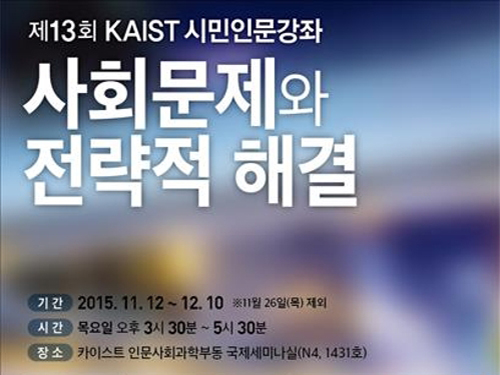 Public Lectures by KAIST's Humanities and Social Sciences Research Center
The Humanities and Social Sciences Research Center at KAIST offers public lectures at the International Seminar Hall of the Humanities and Social Sciences building on campus from November 12, 2015 to December 10, 2015. There will be four lectures, all of which will be available in Korean only.
The theme of the lectures is “social issues and strategic solutions.” Experts in various fields including women’s studies, criminal psychology, Go (a Chinese board game) and its philosophy, and Korean studies will participate, offering multifaceted analysis and solutions for social issues in Korea.
Joo-Hee Kim, a researcher at the Korean Women’s Institute of Ewha Women’s University, will lecture on “Problems of Loan Products Exclusively for Women” and discuss the background of "micro-loans" which are often targeted at women, while evaluating the logic of financial corporations behind marketing such products.
Lectures by Professor Ji-Sun Park from the Department of Social Psychology at Ewha Women’s University on “Understanding of Criminal Psychology from Letters,” Professor Soo-Hyun Jeong from the Department of Go at Myeongji University on “Life Lessons and Strategies from Playing Go,” and Professor Seung-Taek Ahn from Kyujanggak Institute for Korean Studies of Seoul National University on “Community Problems in Folk Culture” will follow.
The organizer of the lectures, Professor Jung-Hoon Kim of the Department of Humanities and Social Sciences at KAIST said,
“These lectures will provide local citizens and the KAIST family a wonderful opportunity to understand important social issues from the perspective of social science. It will also serve as a valuable time to think about how our social conflicts could differ from those of other countries, helping us to find solutions.”
To register for these free lectures, go to http://hss.kaist.ac.kr by November 9, 2015.
2015.11.06 View 7752
Public Lectures by KAIST's Humanities and Social Sciences Research Center
The Humanities and Social Sciences Research Center at KAIST offers public lectures at the International Seminar Hall of the Humanities and Social Sciences building on campus from November 12, 2015 to December 10, 2015. There will be four lectures, all of which will be available in Korean only.
The theme of the lectures is “social issues and strategic solutions.” Experts in various fields including women’s studies, criminal psychology, Go (a Chinese board game) and its philosophy, and Korean studies will participate, offering multifaceted analysis and solutions for social issues in Korea.
Joo-Hee Kim, a researcher at the Korean Women’s Institute of Ewha Women’s University, will lecture on “Problems of Loan Products Exclusively for Women” and discuss the background of "micro-loans" which are often targeted at women, while evaluating the logic of financial corporations behind marketing such products.
Lectures by Professor Ji-Sun Park from the Department of Social Psychology at Ewha Women’s University on “Understanding of Criminal Psychology from Letters,” Professor Soo-Hyun Jeong from the Department of Go at Myeongji University on “Life Lessons and Strategies from Playing Go,” and Professor Seung-Taek Ahn from Kyujanggak Institute for Korean Studies of Seoul National University on “Community Problems in Folk Culture” will follow.
The organizer of the lectures, Professor Jung-Hoon Kim of the Department of Humanities and Social Sciences at KAIST said,
“These lectures will provide local citizens and the KAIST family a wonderful opportunity to understand important social issues from the perspective of social science. It will also serve as a valuable time to think about how our social conflicts could differ from those of other countries, helping us to find solutions.”
To register for these free lectures, go to http://hss.kaist.ac.kr by November 9, 2015.
2015.11.06 View 7752 -
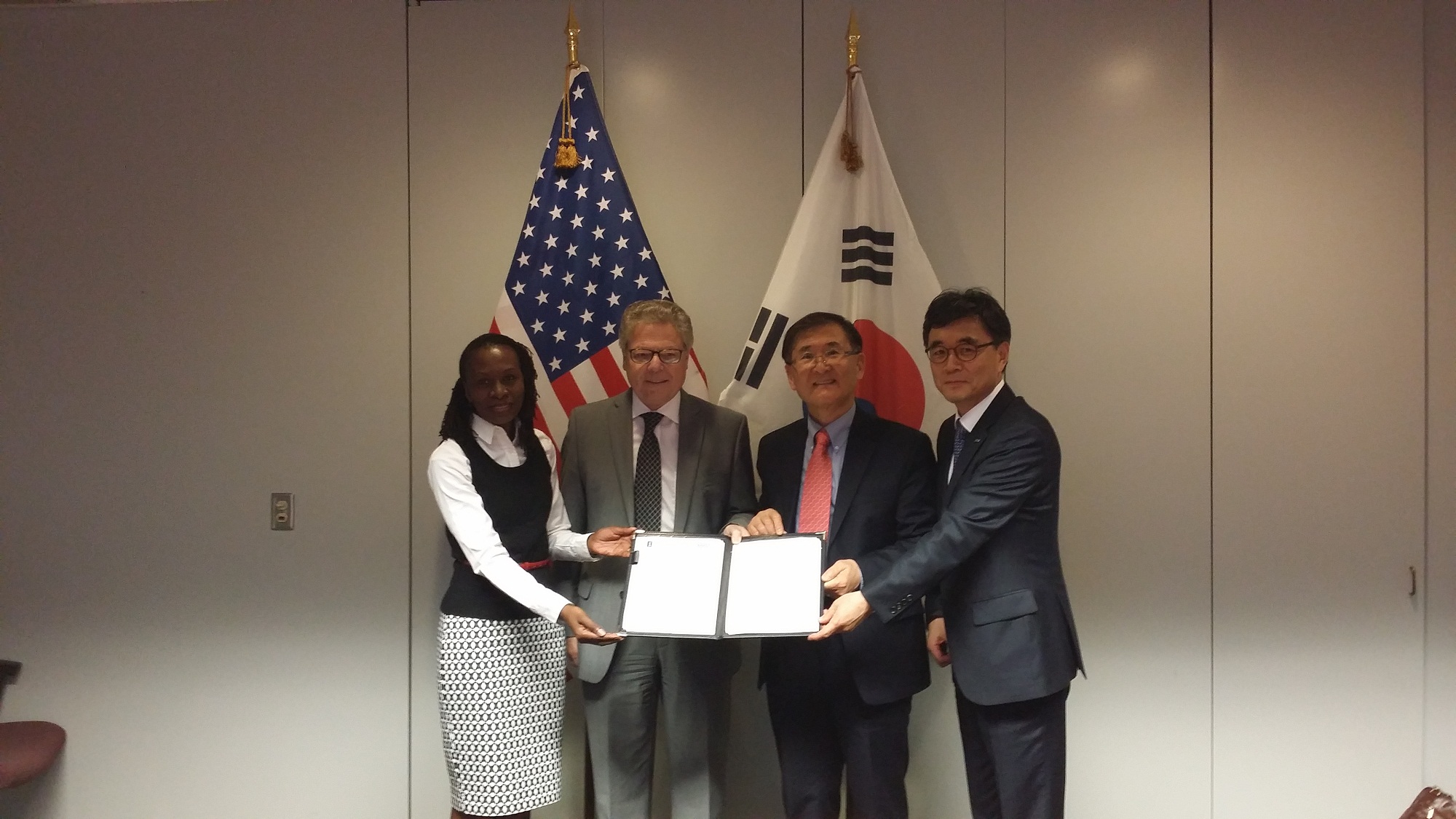 KAIST and University of Illinois at Urbana-Champaign Sign a MOU
KAIST and the University of Illinois at Urbana-Champaign (UIUC) signed a memorandum of understanding on collaboration of research and education on November 5, 2015, at the UIUC campus.
The agreement was made at the request of UIUC, under which the two institutions will exchange students and faculty and implement joint research projects.
President Steve Kang of KAIST said, “With this partnership, KAIST and the University of Illinois at Urbana-Champaign will move forward to advance the fields of medical engineering, life sciences, electrical engineering, and computer science.”
In the picture below, President Steve Kang (second from the right) and Associate Vice President of International Office, Sung-Hyon Myaeng (far right), hold the MOU with UIUC representatives.
2015.11.05 View 5966
KAIST and University of Illinois at Urbana-Champaign Sign a MOU
KAIST and the University of Illinois at Urbana-Champaign (UIUC) signed a memorandum of understanding on collaboration of research and education on November 5, 2015, at the UIUC campus.
The agreement was made at the request of UIUC, under which the two institutions will exchange students and faculty and implement joint research projects.
President Steve Kang of KAIST said, “With this partnership, KAIST and the University of Illinois at Urbana-Champaign will move forward to advance the fields of medical engineering, life sciences, electrical engineering, and computer science.”
In the picture below, President Steve Kang (second from the right) and Associate Vice President of International Office, Sung-Hyon Myaeng (far right), hold the MOU with UIUC representatives.
2015.11.05 View 5966 -
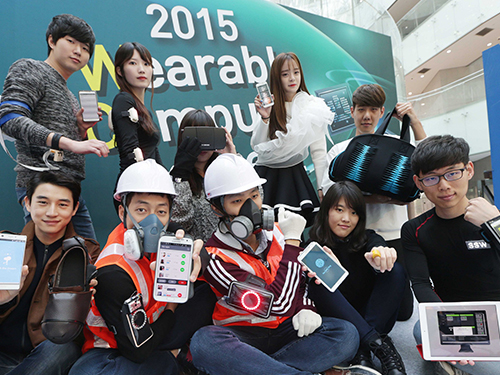 KAIST Hosts the Wearable Computer Contest 2015
“What you see is a compact electronic system on a dust mask, which monitors the amount of dust taken in by a worker and lets other workers know if the person is injured in an industrial site,” said Bum Taek Jung, a Master’s candidate from Sungkyunkwan University during the Wearable Computer Contest 2015 held in KI building of KAIST on November 5, 2015.
He explained his interest in developing this system, “Dust-related respiratory diseases and falling accidents are still prevalent in industrial sites.” He added, “Using the smart dust mask helps monitoring workers’ physical condition in real time, allowing us to cope with accidents in a much more timely manner.” A smart dust mask is a portable device that alerts the user with orange or red light signs when the amount of dust inhaled by the user is higher than the threshold. Its application on a smartphone can also allow project managers to alert the risk of falling accidents to workers by employing a gyroscope and an accelerometer on the mask.
The Wearable Computer Contest 2015 met for the eleventh time at KAIST on November 5-6, 2015. A wearable computer refers to a portable device which users can wear directly on the body or on their clothes while moving. Products that can provide various services by connecting to a smartphone have become increasingly popular. The contest is an excellent opportunity for university students to design creative wearable systems similar to those often depicted in movies and comics.
This year 102 teams from universities all over the nation participated. After screening and evaluation of their presentations, only 8 teams in the product section and 3 teams in the ideas section were selected for the finals. Of the many entries to the contest, the ECG security system caught many people’s attention. The wearable, which attaches to a shirt, acts like an electrocardiogram. By comparing the ECG reading with the one stored in the data server, the wearable can authenticate the user. The system could be widely used by enterprises and financial companies where tight security and authentication are crucial.
The winners of the product and the ideas sections received USD 4,300 and usd 860 respectively along with Minister Prizes from the Minister of Science, ICT and Future Planning of Korea. The Chairman of the contest, Professor Hoi-Jun Yoo from the Electrical Engineering Department of KAIST said, “The contest will be a great opportunity for anyone to have a look at advanced wearable devices developed through close integration of state-of-the-art technologies and creative ideas from young minds.”
2015.11.05 View 9340
KAIST Hosts the Wearable Computer Contest 2015
“What you see is a compact electronic system on a dust mask, which monitors the amount of dust taken in by a worker and lets other workers know if the person is injured in an industrial site,” said Bum Taek Jung, a Master’s candidate from Sungkyunkwan University during the Wearable Computer Contest 2015 held in KI building of KAIST on November 5, 2015.
He explained his interest in developing this system, “Dust-related respiratory diseases and falling accidents are still prevalent in industrial sites.” He added, “Using the smart dust mask helps monitoring workers’ physical condition in real time, allowing us to cope with accidents in a much more timely manner.” A smart dust mask is a portable device that alerts the user with orange or red light signs when the amount of dust inhaled by the user is higher than the threshold. Its application on a smartphone can also allow project managers to alert the risk of falling accidents to workers by employing a gyroscope and an accelerometer on the mask.
The Wearable Computer Contest 2015 met for the eleventh time at KAIST on November 5-6, 2015. A wearable computer refers to a portable device which users can wear directly on the body or on their clothes while moving. Products that can provide various services by connecting to a smartphone have become increasingly popular. The contest is an excellent opportunity for university students to design creative wearable systems similar to those often depicted in movies and comics.
This year 102 teams from universities all over the nation participated. After screening and evaluation of their presentations, only 8 teams in the product section and 3 teams in the ideas section were selected for the finals. Of the many entries to the contest, the ECG security system caught many people’s attention. The wearable, which attaches to a shirt, acts like an electrocardiogram. By comparing the ECG reading with the one stored in the data server, the wearable can authenticate the user. The system could be widely used by enterprises and financial companies where tight security and authentication are crucial.
The winners of the product and the ideas sections received USD 4,300 and usd 860 respectively along with Minister Prizes from the Minister of Science, ICT and Future Planning of Korea. The Chairman of the contest, Professor Hoi-Jun Yoo from the Electrical Engineering Department of KAIST said, “The contest will be a great opportunity for anyone to have a look at advanced wearable devices developed through close integration of state-of-the-art technologies and creative ideas from young minds.”
2015.11.05 View 9340 -
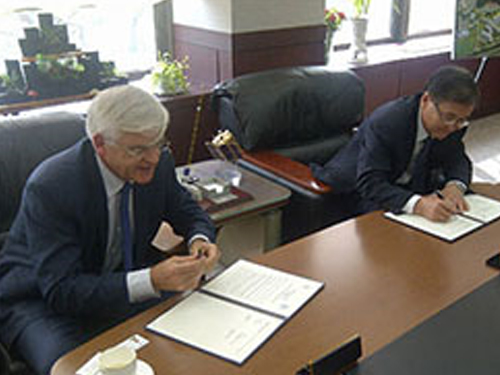 Partnership with École Centrale Paris
Courtesy of École Centrale Paris News: http://www.ecp.fr/lang/en/home/news?actuID=48892
Strengthening of the partnership betwenn CentraleSupélec and KAIST University, South Korea
The two institutions signed a new agreement.
Hervé Biausser (left in the picture), Director of CentraleSupélec, has met Sung-Mo Steve Kang (right in the picture), the President of the Korea Advanced Institute of Science and Technology (KAIST). They signed an agreement aiming to strengthen the partnership between the two institutions concerning research and higher education.
CentraleSupélec and KAIST have cooperated since 2010 on research projects in the context of the Erasmus Mundus BEAM and EASED programs, which are coordinated by CentraleSupélec.
The next step is now the application of graduate academic mobility in the common fields of excellency of the institutions: energy, electronic, physics and mathematics.
2015.11.02 View 6435
Partnership with École Centrale Paris
Courtesy of École Centrale Paris News: http://www.ecp.fr/lang/en/home/news?actuID=48892
Strengthening of the partnership betwenn CentraleSupélec and KAIST University, South Korea
The two institutions signed a new agreement.
Hervé Biausser (left in the picture), Director of CentraleSupélec, has met Sung-Mo Steve Kang (right in the picture), the President of the Korea Advanced Institute of Science and Technology (KAIST). They signed an agreement aiming to strengthen the partnership between the two institutions concerning research and higher education.
CentraleSupélec and KAIST have cooperated since 2010 on research projects in the context of the Erasmus Mundus BEAM and EASED programs, which are coordinated by CentraleSupélec.
The next step is now the application of graduate academic mobility in the common fields of excellency of the institutions: energy, electronic, physics and mathematics.
2015.11.02 View 6435 -
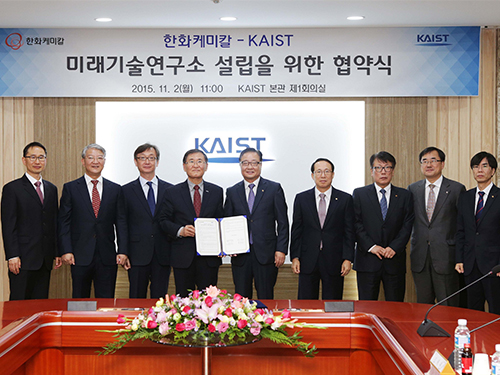 KAIST and Hanwha Chemical Agree on Research Collaboration
KAIST signed a memorandum of understanding (MOU) with Hanwha Chemical Co., Ltd., a Korean chemical and auto manufacturer, on November 2, 2015 to establish a research center on campus.
The research center, which will be named “KAIST-Hanwha Chemical Future Technology Research Center,” will implement joint research projects for five years beginning from 2016 to develop innovative, green technologies that will help the Korean chemical industry boost its global competitiveness and to nurture top researchers and engineers in chemical engineering.
The research center will lead the development of next-generation petrochemical materials and manufacturing technology and the establishment of pure high-refining processes which are more energy-efficient and environmentally friendly. KAIST and Hanwha will strive to secure new technologies that have the greatest commercialization potential in the global market. They will also establish a scholarship fund for 15 KAIST doctoral students in the Department of Chemical and Biomolecular Engineering.
Many professors from the Chemical and Biomolecular Engineering Department including Distinguished Professor Sang Yup Lee, who was listed in the Top 20 Translational Researchers of 2014 by Nature Biotechnology this year, and Professor Hyunjoo Lee who received the Woman Scholar award at the 2015 World Chemistry Conference, will work at the research center.
Professor Lee, the head of the research center, said, “Collaborating with Hanwha will give us a strong basis for our efforts to carry out original research and train the best researchers in the field.”
Chang-Bum Kim, the Chief Executive Officer (CEO) of Hanwha Chemical, said,
“We hope our collaborations with KAIST will go beyond the typical industry and university cooperation. The two organizations will indeed jointly operate the research center, and this will become a new model for industry and university cooperation. We expect that the research center will play a crucial role in the development of new products and technologies to grow the Korean chemical industry.”
In the photo, President Steve Kang of KAIST (fourth from left) and CEO Chang-Bum Kim of Hanwha Chemical (fifth from left) hold the MOU together.
2015.11.01 View 12992
KAIST and Hanwha Chemical Agree on Research Collaboration
KAIST signed a memorandum of understanding (MOU) with Hanwha Chemical Co., Ltd., a Korean chemical and auto manufacturer, on November 2, 2015 to establish a research center on campus.
The research center, which will be named “KAIST-Hanwha Chemical Future Technology Research Center,” will implement joint research projects for five years beginning from 2016 to develop innovative, green technologies that will help the Korean chemical industry boost its global competitiveness and to nurture top researchers and engineers in chemical engineering.
The research center will lead the development of next-generation petrochemical materials and manufacturing technology and the establishment of pure high-refining processes which are more energy-efficient and environmentally friendly. KAIST and Hanwha will strive to secure new technologies that have the greatest commercialization potential in the global market. They will also establish a scholarship fund for 15 KAIST doctoral students in the Department of Chemical and Biomolecular Engineering.
Many professors from the Chemical and Biomolecular Engineering Department including Distinguished Professor Sang Yup Lee, who was listed in the Top 20 Translational Researchers of 2014 by Nature Biotechnology this year, and Professor Hyunjoo Lee who received the Woman Scholar award at the 2015 World Chemistry Conference, will work at the research center.
Professor Lee, the head of the research center, said, “Collaborating with Hanwha will give us a strong basis for our efforts to carry out original research and train the best researchers in the field.”
Chang-Bum Kim, the Chief Executive Officer (CEO) of Hanwha Chemical, said,
“We hope our collaborations with KAIST will go beyond the typical industry and university cooperation. The two organizations will indeed jointly operate the research center, and this will become a new model for industry and university cooperation. We expect that the research center will play a crucial role in the development of new products and technologies to grow the Korean chemical industry.”
In the photo, President Steve Kang of KAIST (fourth from left) and CEO Chang-Bum Kim of Hanwha Chemical (fifth from left) hold the MOU together.
2015.11.01 View 12992 -
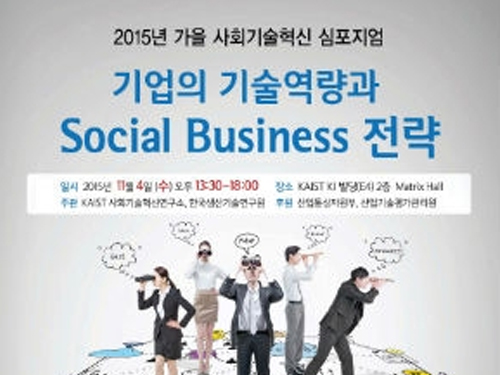 KAIST Invites Entrepreneurs and Experts to Participate in a Social Technology Innovation Symposium
The Research Institute for Social Technology and Innovation (RISTI) at KAIST hosted the Social Technology Innovation Symposium on November 4, 2015 in KI building, to which 100 social business entrepreneurs and experts in the field were invited.
Social businesses refer to activities of companies, which strive to resolve social problems such as environmental issues, income inequality, and aging societies while seeking profit at the same time. This is different from companies taking social responsibility and non-profit organization serving the community in that they attempt to solve social problems through a sustainable business model.
Held under the theme of “technology capabilities of companies and social business strategies,” this symposium was the first to gather representatives from social venture companies, medium-sized enterprises, and major companies at one place to share their experiences in a social business and to discuss future tasks.
The symposium was divided into sessions with three different topics ranging from social business strategies using information technology, a social business and its business model, and social business strategies of major companies.
The symposium started with keynote speeches delivered by Professor HongKyu Lee, RISTI, and Professor Hong-Tak Lim, RISTI, who discussed the role of technology in a social business. It was followed by plenary sessions led by CEOs who are running social businesses such as the Sharing and Technologies Incorporated Project, Simwon Technology, Ecojun Company, Underdogs, and the Farming Fund as well as by representatives from a social responsibility section of CJ management team and the social responsibility council of SK. In the future, these talks will serve as a medium to share their experiences in social businesses and to discuss the role of technology in the business. Some talks touched upon topics such as development of platforms for social innovation, social businesses employing disabled workers, and crowd funding for farming.
The Director of RISTI, Professor HongKyu Lee said, “The symposium will be the first to have people from leading companies in social businesses in Korea in one place.” He added, “This will be a great opportunity for anyone to know what will be the future of social businesses, which were created to solve the social problems caused by capitalism.”
The symposium was sponsored by the Ministry of Trade, Industry, and Energy of Korea.
2015.10.30 View 9951
KAIST Invites Entrepreneurs and Experts to Participate in a Social Technology Innovation Symposium
The Research Institute for Social Technology and Innovation (RISTI) at KAIST hosted the Social Technology Innovation Symposium on November 4, 2015 in KI building, to which 100 social business entrepreneurs and experts in the field were invited.
Social businesses refer to activities of companies, which strive to resolve social problems such as environmental issues, income inequality, and aging societies while seeking profit at the same time. This is different from companies taking social responsibility and non-profit organization serving the community in that they attempt to solve social problems through a sustainable business model.
Held under the theme of “technology capabilities of companies and social business strategies,” this symposium was the first to gather representatives from social venture companies, medium-sized enterprises, and major companies at one place to share their experiences in a social business and to discuss future tasks.
The symposium was divided into sessions with three different topics ranging from social business strategies using information technology, a social business and its business model, and social business strategies of major companies.
The symposium started with keynote speeches delivered by Professor HongKyu Lee, RISTI, and Professor Hong-Tak Lim, RISTI, who discussed the role of technology in a social business. It was followed by plenary sessions led by CEOs who are running social businesses such as the Sharing and Technologies Incorporated Project, Simwon Technology, Ecojun Company, Underdogs, and the Farming Fund as well as by representatives from a social responsibility section of CJ management team and the social responsibility council of SK. In the future, these talks will serve as a medium to share their experiences in social businesses and to discuss the role of technology in the business. Some talks touched upon topics such as development of platforms for social innovation, social businesses employing disabled workers, and crowd funding for farming.
The Director of RISTI, Professor HongKyu Lee said, “The symposium will be the first to have people from leading companies in social businesses in Korea in one place.” He added, “This will be a great opportunity for anyone to know what will be the future of social businesses, which were created to solve the social problems caused by capitalism.”
The symposium was sponsored by the Ministry of Trade, Industry, and Energy of Korea.
2015.10.30 View 9951 -
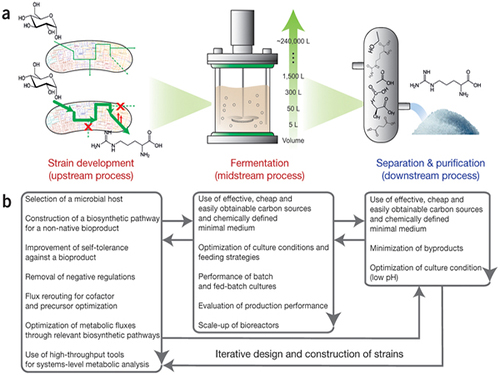 Establishment of System Metabolic Engineering Strategies
Although conventional petrochemical processes have generated chemicals and materials which have been useful to mankind, they have also triggered a variety of environmental problems including climate change and relied too much on nonrenewable natural resources. To ameliorate this, researchers have actively pursued the development of industrial microbial strains around the globe in order to overproduce industrially useful chemicals and materials from microbes using renewable biomass. This discipline is called metabolic engineering.
Thanks to advances in genetic engineering and our knowledge of cellular metabolism, conventional metabolic engineering efforts have succeeded to a certain extent in developing microbial strains that overproduce bioproducts at an industrial level. However, many metabolic engineering projects launched in academic labs do not reach commercial markets due to a failure to fully integrate industrial bioprocesses.
In response to this, Distinguished Professor Sang Yup Lee and Dr. Hyun Uk Kim, both from the Department of Chemical and Biomolecular Engineering at KAIST, have recently suggested ten general strategies of systems metabolic engineering to successfully develop industrial microbial strains. Systems metabolic engineering differs from conventional metabolic engineering by incorporating traditional metabolic engineering approaches along with tools of other fields, such as systems biology, synthetic biology, and molecular evolution.
The ten strategies of systems metabolic engineering have been featured in Nature Biotechnology released online in October 2015, which is entitled "Systems strategies for developing industrial microbial strains."
The strategies cover economic, state-of-the-art biological techniques and traditional bioprocess aspects. Specifically, they consist of: 1) project design including economic evaluation of a target bioproduct; 2) selection of host strains to be used for overproduction of a bioproduct; 3) metabolic pathway reconstruction for bioproducts that are not naturally produced in the selected host strains; 4) increasing tolerance of a host strain against the bioproduct; 5) removing negative regulatory circuits in the microbial host limiting overproduction of a bioproduct; 6) rerouting intracellular fluxes to optimize cofactor and precursor availability necessary for the bioproduct formation; 7) diagnosing and optimizing metabolic fluxes towards product formation; 8) diagnosis and optimization of microbial culture conditions including carbon sources; 9) system-wide gene manipulation to further increase the host strain's production performance using high-throughput genome-scale engineering and computational tools; and 10) scale-up fermentation of the developed strain and diagnosis for the reproducibility of the strain's production performance.
These ten strategies were articulated with successful examples of the production of L-arginine using Corynebacterium glutamicum, 1,4-butanediol using Escherichia coli, and L-lysine and bio-nylon using C. glutamicum.
Professor Sang Yup Lee said, "At the moment, the chance of commercializing microbial strains developed in academic labs is very low. The strategies of systems metabolic engineering outlined in this analysis can serve as guidelines when developing industrial microbial strains. We hope that these strategies contribute to improving opportunities to commercialize microbial strains developed in academic labs with drastically reduced costs and efforts, and that a large fraction of petroleum-based processes will be replaced with sustainable bioprocesses."
Lee S. Y. & Kim, H. U. Systems Strategies for Developing Industrial Microbial Strains. Nature Biotechnology (2015).
This work was supported by the Technology Development Program to Solve Climate Change on Systems Metabolic Engineering for Biorefineries (NRF-2012M1A2A2026556) and by the Intelligent Synthetic Biology Center through the Global Frontier Project (2011-0031963) from the Ministry of Science, ICT and Future Planning (MSIP), Korea, and through the National Research Foundation (NRF) of Korea. This work was also supported by the Novo Nordisk Foundation.
Picture: Concept of the Systems Metabolic Engineering Framework
(a) Three major bioprocess stages (b) Considerations in systems metabolic engineering to optimize the whole bioprocess. List of considerations for the strain development and fermentation contribute to improving microbial strain's production performance (red), whereas those for the separation and purification help in reducing overall operation costs by facilitating the downstream process (blue). Some of the considerations can be repeated in the course of systems metabolic engineering.
2015.10.19 View 11751
Establishment of System Metabolic Engineering Strategies
Although conventional petrochemical processes have generated chemicals and materials which have been useful to mankind, they have also triggered a variety of environmental problems including climate change and relied too much on nonrenewable natural resources. To ameliorate this, researchers have actively pursued the development of industrial microbial strains around the globe in order to overproduce industrially useful chemicals and materials from microbes using renewable biomass. This discipline is called metabolic engineering.
Thanks to advances in genetic engineering and our knowledge of cellular metabolism, conventional metabolic engineering efforts have succeeded to a certain extent in developing microbial strains that overproduce bioproducts at an industrial level. However, many metabolic engineering projects launched in academic labs do not reach commercial markets due to a failure to fully integrate industrial bioprocesses.
In response to this, Distinguished Professor Sang Yup Lee and Dr. Hyun Uk Kim, both from the Department of Chemical and Biomolecular Engineering at KAIST, have recently suggested ten general strategies of systems metabolic engineering to successfully develop industrial microbial strains. Systems metabolic engineering differs from conventional metabolic engineering by incorporating traditional metabolic engineering approaches along with tools of other fields, such as systems biology, synthetic biology, and molecular evolution.
The ten strategies of systems metabolic engineering have been featured in Nature Biotechnology released online in October 2015, which is entitled "Systems strategies for developing industrial microbial strains."
The strategies cover economic, state-of-the-art biological techniques and traditional bioprocess aspects. Specifically, they consist of: 1) project design including economic evaluation of a target bioproduct; 2) selection of host strains to be used for overproduction of a bioproduct; 3) metabolic pathway reconstruction for bioproducts that are not naturally produced in the selected host strains; 4) increasing tolerance of a host strain against the bioproduct; 5) removing negative regulatory circuits in the microbial host limiting overproduction of a bioproduct; 6) rerouting intracellular fluxes to optimize cofactor and precursor availability necessary for the bioproduct formation; 7) diagnosing and optimizing metabolic fluxes towards product formation; 8) diagnosis and optimization of microbial culture conditions including carbon sources; 9) system-wide gene manipulation to further increase the host strain's production performance using high-throughput genome-scale engineering and computational tools; and 10) scale-up fermentation of the developed strain and diagnosis for the reproducibility of the strain's production performance.
These ten strategies were articulated with successful examples of the production of L-arginine using Corynebacterium glutamicum, 1,4-butanediol using Escherichia coli, and L-lysine and bio-nylon using C. glutamicum.
Professor Sang Yup Lee said, "At the moment, the chance of commercializing microbial strains developed in academic labs is very low. The strategies of systems metabolic engineering outlined in this analysis can serve as guidelines when developing industrial microbial strains. We hope that these strategies contribute to improving opportunities to commercialize microbial strains developed in academic labs with drastically reduced costs and efforts, and that a large fraction of petroleum-based processes will be replaced with sustainable bioprocesses."
Lee S. Y. & Kim, H. U. Systems Strategies for Developing Industrial Microbial Strains. Nature Biotechnology (2015).
This work was supported by the Technology Development Program to Solve Climate Change on Systems Metabolic Engineering for Biorefineries (NRF-2012M1A2A2026556) and by the Intelligent Synthetic Biology Center through the Global Frontier Project (2011-0031963) from the Ministry of Science, ICT and Future Planning (MSIP), Korea, and through the National Research Foundation (NRF) of Korea. This work was also supported by the Novo Nordisk Foundation.
Picture: Concept of the Systems Metabolic Engineering Framework
(a) Three major bioprocess stages (b) Considerations in systems metabolic engineering to optimize the whole bioprocess. List of considerations for the strain development and fermentation contribute to improving microbial strain's production performance (red), whereas those for the separation and purification help in reducing overall operation costs by facilitating the downstream process (blue). Some of the considerations can be repeated in the course of systems metabolic engineering.
2015.10.19 View 11751 -
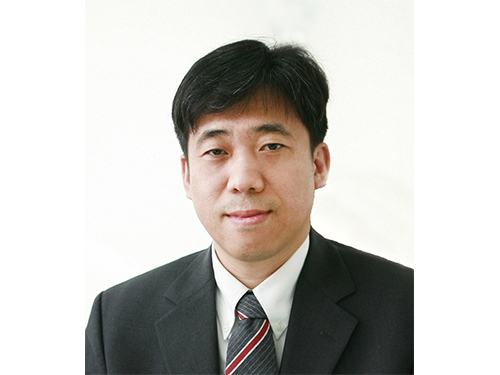 Professor Ki-Jun Jeong Wins the 2015 Dam Yeun Academic Award
The 11th Dam Yeun Academic Award presented by the Korean Society for Biotechnology and Bioengineering (KSBB) to a biologist under 45 years old went to Professor Ki-Jun Jeong of the Chemical and Biomolecular Engineering Department at KAIST.
The award ceremony took place on October 13, 2015, at the annual conference of KSBB held at Songdo Convensia in Incheon City.
Each year KSBB announces the recipient of the award based on the publications by researchers in the last five years at peer-reviewed international journals or KSBB Journal as well as the record of patent registration and technology transfers.
Professor Jeong is recognized for his pioneering research in protein, antibody, cellular engineering, and protein displays and chips.
2015.10.19 View 10481
Professor Ki-Jun Jeong Wins the 2015 Dam Yeun Academic Award
The 11th Dam Yeun Academic Award presented by the Korean Society for Biotechnology and Bioengineering (KSBB) to a biologist under 45 years old went to Professor Ki-Jun Jeong of the Chemical and Biomolecular Engineering Department at KAIST.
The award ceremony took place on October 13, 2015, at the annual conference of KSBB held at Songdo Convensia in Incheon City.
Each year KSBB announces the recipient of the award based on the publications by researchers in the last five years at peer-reviewed international journals or KSBB Journal as well as the record of patent registration and technology transfers.
Professor Jeong is recognized for his pioneering research in protein, antibody, cellular engineering, and protein displays and chips.
2015.10.19 View 10481 -
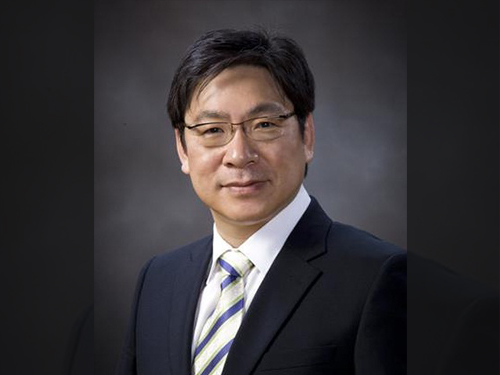 Professor Key-Sun Choi Receives the Order of Service Merit Green Stripes from the Korean Government
The award recognizes Professor Choi’s life-long research effort to make Korean language digitally available, both nationally and internationally.
Professor Key-Sun Choi of the School of Computing at KAIST received the Order of Service Merit Green Stripes from the Korean government at the 569th Korean Language Day, held annually to commemorate the invention of the Korean language, Hangeul. The ceremony took place on October 9, 2015, at the Sejong Center in Seoul.
Professor Choi has distinguished himself in the field of natural language processing (NLP), including Korean language. He developed a Korean NLP parser that enabled information processing and data analysis of Korean language, as well as a digital Korean dictionary, contributing to the advancement of Korean language-based information technology.
Professor Choi also led the way to widespread use of Korean natural language in computing by developing and commercializing open source software to process the Korean language.
He has served leading roles in many of the international academic societies and standardization organizations, among others, as the vice president of Infoterm (the International Information Center for Terminology), president of the Asia Federation of Natural Language Processing, vice chair of ISO/TC 37, a technical committee in the International Organization for Standardization (ISO), and a council member for the International Association of Machine Translation.
2015.10.08 View 9895
Professor Key-Sun Choi Receives the Order of Service Merit Green Stripes from the Korean Government
The award recognizes Professor Choi’s life-long research effort to make Korean language digitally available, both nationally and internationally.
Professor Key-Sun Choi of the School of Computing at KAIST received the Order of Service Merit Green Stripes from the Korean government at the 569th Korean Language Day, held annually to commemorate the invention of the Korean language, Hangeul. The ceremony took place on October 9, 2015, at the Sejong Center in Seoul.
Professor Choi has distinguished himself in the field of natural language processing (NLP), including Korean language. He developed a Korean NLP parser that enabled information processing and data analysis of Korean language, as well as a digital Korean dictionary, contributing to the advancement of Korean language-based information technology.
Professor Choi also led the way to widespread use of Korean natural language in computing by developing and commercializing open source software to process the Korean language.
He has served leading roles in many of the international academic societies and standardization organizations, among others, as the vice president of Infoterm (the International Information Center for Terminology), president of the Asia Federation of Natural Language Processing, vice chair of ISO/TC 37, a technical committee in the International Organization for Standardization (ISO), and a council member for the International Association of Machine Translation.
2015.10.08 View 9895 -
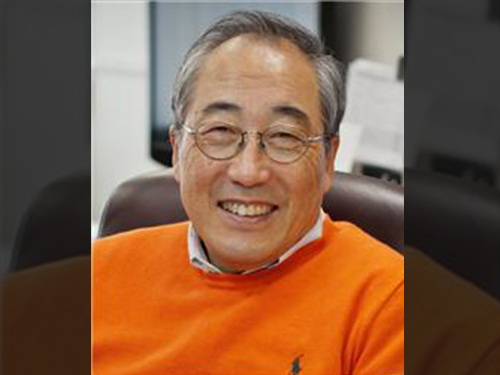 Yang-Hann Kim named recipient of the Rossing Prize in Acoustics Education by the Acoustical Society of America
Courtesy of the Acoustical Society of America (ASA)
Press release issued by ASA on October 8, 2015:
Yang-Hann Kim named recipient of the Rossing Prize in Acoustics Education by the Acoustical Society of America
Melville (NY), 8 October 2015—Yang-Hann Kim, Professor at KAIST (Korea Advanced Institute of Science and Technology), Daejeon, has been named recipient of the Acoustical Society of America (ASA) Rossing Prize in Acoustics Education. The Rossing Prize is awarded to an individual who has made significant contributions toward furthering acoustics education through distinguished teaching, creation of educational materials, textbook writing and other activities. The Prize will be presented at the 170th meeting of the ASA on 4 November 2015 in Jacksonville, Florida.
“It is my great honor to receive the Rossing Prize, which has been given to outstanding scholar members of ASA since 2003. I never dreamed to be one of them.” said Kim. “I must express my deep respect and love to my friend Thomas Rossing: I have known him more than 20 years, always respect what he has done for teaching, writing books, and pioneering work in musical acoustics.”
Yang-Hann Kim is a Fellow of the Acoustical Society of America. He received a Ph.D. from the Massachusetts Institute of Technology. His main research interests in acoustics began with “sound visualization” resulted in the development of the “sound camera” which makes any sound visible instantly. Then he moved to “sound manipulation.” Using his manipulation technology, one can move any sound in space and time, positioning sound, and can create a private sound zone. Sound Visualization and Manipulation, (Wiley, 2013), summarizes these two fields. Dr. Kim’s textbook, Sound Propagation: An Impedance Based Approach (John Wiley and Sons, 2010), is well acknowledged by the associated professional communities as one of best acoustics textbooks. Using his teaching experience at KAIST, he created a YouTube lecture on acoustics and vibration which is also available in MOOC (Massive Open Online Course). He has also presented lectures to over 500 engineers and technicians for the past 30 years.
###
The Acoustical Society of America (ASA) is the premier international scientific society in acoustics devoted to the science and technology of sound. Its 7000 members worldwide represent a broad spectrum of the study of acoustics. ASA publications include the Journal of the Acoustical Society of America—the world’s leading journal on acoustics, Acoustics Today magazine, books, and standards on acoustics. The Society also holds two major scientific meetings per year. For more information about the Society visit our website, www.acousticalsociety.org.
2015.10.06 View 10860
Yang-Hann Kim named recipient of the Rossing Prize in Acoustics Education by the Acoustical Society of America
Courtesy of the Acoustical Society of America (ASA)
Press release issued by ASA on October 8, 2015:
Yang-Hann Kim named recipient of the Rossing Prize in Acoustics Education by the Acoustical Society of America
Melville (NY), 8 October 2015—Yang-Hann Kim, Professor at KAIST (Korea Advanced Institute of Science and Technology), Daejeon, has been named recipient of the Acoustical Society of America (ASA) Rossing Prize in Acoustics Education. The Rossing Prize is awarded to an individual who has made significant contributions toward furthering acoustics education through distinguished teaching, creation of educational materials, textbook writing and other activities. The Prize will be presented at the 170th meeting of the ASA on 4 November 2015 in Jacksonville, Florida.
“It is my great honor to receive the Rossing Prize, which has been given to outstanding scholar members of ASA since 2003. I never dreamed to be one of them.” said Kim. “I must express my deep respect and love to my friend Thomas Rossing: I have known him more than 20 years, always respect what he has done for teaching, writing books, and pioneering work in musical acoustics.”
Yang-Hann Kim is a Fellow of the Acoustical Society of America. He received a Ph.D. from the Massachusetts Institute of Technology. His main research interests in acoustics began with “sound visualization” resulted in the development of the “sound camera” which makes any sound visible instantly. Then he moved to “sound manipulation.” Using his manipulation technology, one can move any sound in space and time, positioning sound, and can create a private sound zone. Sound Visualization and Manipulation, (Wiley, 2013), summarizes these two fields. Dr. Kim’s textbook, Sound Propagation: An Impedance Based Approach (John Wiley and Sons, 2010), is well acknowledged by the associated professional communities as one of best acoustics textbooks. Using his teaching experience at KAIST, he created a YouTube lecture on acoustics and vibration which is also available in MOOC (Massive Open Online Course). He has also presented lectures to over 500 engineers and technicians for the past 30 years.
###
The Acoustical Society of America (ASA) is the premier international scientific society in acoustics devoted to the science and technology of sound. Its 7000 members worldwide represent a broad spectrum of the study of acoustics. ASA publications include the Journal of the Acoustical Society of America—the world’s leading journal on acoustics, Acoustics Today magazine, books, and standards on acoustics. The Society also holds two major scientific meetings per year. For more information about the Society visit our website, www.acousticalsociety.org.
2015.10.06 View 10860 -
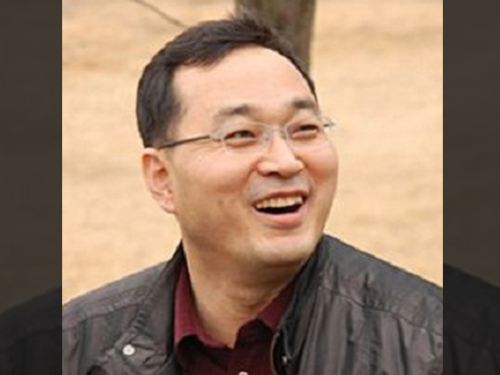 Professor Junehwa Song Appointed as the General Chair of the Organizing Committee of ACM SenSys
Professor Junehwa Song from the Schooling of Computing at KAIST has been appointed the general chair of the organizing committee of ACM SenSys—the American Computing Machine (ACM) Conference on Embedded Networked Sensor Systems.
ACM SenSys held its first conference in 2003 to promote research on wireless sensor networks and embedded systems. Since then, it has expanded into an influential international conference especially with the increasing importance in sensor technologies. Recently the committee has expanded its field of interest to mobile sensors, the Internet of Things, smart device system, and security.
Professor Song is considered a world-renown researcher in mobile and ubiquitous computing system. He presented numerous research papers at various conferences organized by ACM. He is also a member of the editorial committee of the Institute of Electrical and Electronics Engineers (IEEE) Transactions on Mobile Computing journal. For his achievements in the field and flair for coordinating and planning conferences, he is now the first Korean researcher to be appointed the chair of ACM SenSys.
Professor Song said that, as the chair, he would help discover new technology in and applications of networked, wireless sensors that would meet the demands of our modern society.
The 13th ACM SenSys will take place in Seoul—the first one to be held in Asia. The event will begin on November 1, 2015 and last four days. More information about this year’s event can be found at http://sensys.acm.org/2015/.
2015.10.02 View 8679
Professor Junehwa Song Appointed as the General Chair of the Organizing Committee of ACM SenSys
Professor Junehwa Song from the Schooling of Computing at KAIST has been appointed the general chair of the organizing committee of ACM SenSys—the American Computing Machine (ACM) Conference on Embedded Networked Sensor Systems.
ACM SenSys held its first conference in 2003 to promote research on wireless sensor networks and embedded systems. Since then, it has expanded into an influential international conference especially with the increasing importance in sensor technologies. Recently the committee has expanded its field of interest to mobile sensors, the Internet of Things, smart device system, and security.
Professor Song is considered a world-renown researcher in mobile and ubiquitous computing system. He presented numerous research papers at various conferences organized by ACM. He is also a member of the editorial committee of the Institute of Electrical and Electronics Engineers (IEEE) Transactions on Mobile Computing journal. For his achievements in the field and flair for coordinating and planning conferences, he is now the first Korean researcher to be appointed the chair of ACM SenSys.
Professor Song said that, as the chair, he would help discover new technology in and applications of networked, wireless sensors that would meet the demands of our modern society.
The 13th ACM SenSys will take place in Seoul—the first one to be held in Asia. The event will begin on November 1, 2015 and last four days. More information about this year’s event can be found at http://sensys.acm.org/2015/.
2015.10.02 View 8679